ENAS 400 Students 'Making It" Work With Start-Up Pitches
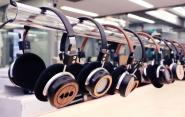
Aiming for ways to revolutionize how we live – from the office desk to how families eat – the students in Making It (ENAS 400) aimed high. In its first year, Dr. Joe Zinter, the assistant director of the Center for Engineering Innovation & Design who teaches the course, said Making It sits at the intersection of design, technology and entrepreneurship.
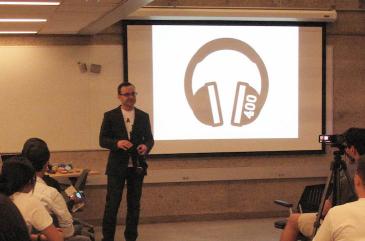 Earlier in the semester, each student in the class pitched an idea for a product. The students chose the five best ideas, formed teams around them, and worked on their business models and prototypes in the CEID's John Klingenstein '50 Design Lab. Throughout the semester, guests including entrepreneurs, designers, venture capitalists, and mentors from the Yale Entrepreneurial Institute visited the class to discuss the ins and outs of starting a business. The final results show that the efforts paid off.
Earlier in the semester, each student in the class pitched an idea for a product. The students chose the five best ideas, formed teams around them, and worked on their business models and prototypes in the CEID's John Klingenstein '50 Design Lab. Throughout the semester, guests including entrepreneurs, designers, venture capitalists, and mentors from the Yale Entrepreneurial Institute visited the class to discuss the ins and outs of starting a business. The final results show that the efforts paid off.
"We had five extremely creative products," Zinter said. "I am tremendously impressed with the quality of the ideas, prototypes and business plans."
As their final project, the student teams "pitched" their start-ups to an audience at the the Center for Engineering Innovation and Design.
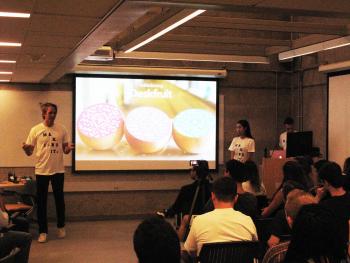 Deskfruit - Many of the great innovations we've seen over the last several years originated at desks. And yet, the desk itself has pretty much remained the same. The Deskfruit team – Paul Singer '16, Steph Rhee '16, and Teddy Mathias '17 - wants to change that and make desks personal and creative spaces. Using "augmented reality," the team developed objects that interact with a smart phone app to create floating projections – such as what appears to be a two-foot cactus, for instance. With phone in hand, look down on to the Deskfruit, and the digital image projects outward. Now your desk has instantly been transformed.
Deskfruit - Many of the great innovations we've seen over the last several years originated at desks. And yet, the desk itself has pretty much remained the same. The Deskfruit team – Paul Singer '16, Steph Rhee '16, and Teddy Mathias '17 - wants to change that and make desks personal and creative spaces. Using "augmented reality," the team developed objects that interact with a smart phone app to create floating projections – such as what appears to be a two-foot cactus, for instance. With phone in hand, look down on to the Deskfruit, and the digital image projects outward. Now your desk has instantly been transformed.
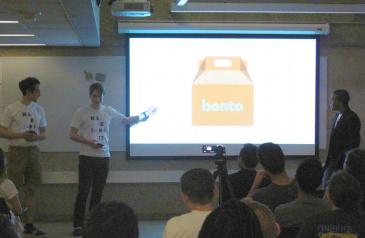 Bento – Not sure what to have for dinner? Bento's on it, with something cheaper than a restaurant, and more nutritious than takeout. The business, comprising students Walden Davis '16, Alex Tenn '16, and John Chirikjian '17, focuses on providing meals that you buy at the store, and with minimal preparation, are ready to eat. They've partnered with some local stores for their launch. Meals include shrimp pasta, tilapia, yaki, a quinoa bowl, and chicken tacos – each one yielding two to four servings and costing $12 to $16. The partners plan to roll out a new meal each week.
Bento – Not sure what to have for dinner? Bento's on it, with something cheaper than a restaurant, and more nutritious than takeout. The business, comprising students Walden Davis '16, Alex Tenn '16, and John Chirikjian '17, focuses on providing meals that you buy at the store, and with minimal preparation, are ready to eat. They've partnered with some local stores for their launch. Meals include shrimp pasta, tilapia, yaki, a quinoa bowl, and chicken tacos – each one yielding two to four servings and costing $12 to $16. The partners plan to roll out a new meal each week.
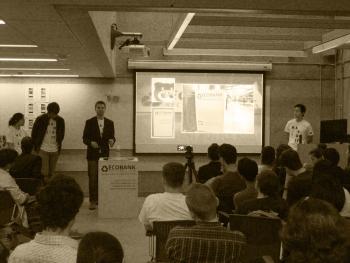 ECOBANK – The Ecobank recycling box looks simple, but business partners Doo Lee '16, John Dorsch '16, and Sandeep Peddada '16 hope they will have a big impact on the environment and local community. The boxes, made at the CEID, are receptacles for plastic bottles and aluminum cans, which are then deposited at a local redemption center. The business partners project that each bin they place on campus will collect $20 worth of recyclables per month. For additional revenue, the company will sell advertising on the boxes, and all proceeds are fed back to local charities.
ECOBANK – The Ecobank recycling box looks simple, but business partners Doo Lee '16, John Dorsch '16, and Sandeep Peddada '16 hope they will have a big impact on the environment and local community. The boxes, made at the CEID, are receptacles for plastic bottles and aluminum cans, which are then deposited at a local redemption center. The business partners project that each bin they place on campus will collect $20 worth of recyclables per month. For additional revenue, the company will sell advertising on the boxes, and all proceeds are fed back to local charities.
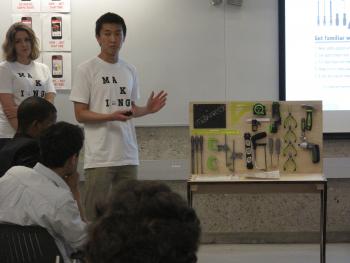 Makiverse – The problem with kids using real tools is that most tools are made for adults. The problem with tool-like toys is that they don't build anything. Hence, Makiverse, the business formed by Carlene Huard '16, Mavi Miller '16, and Jeffrey Gau '16. Makiverse's two products are a workbench for $100 and, for $55, a set of 23 kid-size, functioning tools that include files, clamps and saws – "everything you need to take on a wide variety of projects." The partners' research found that, while children prove adept at a number of computer skills, they're much less so at using tools and hands-on building skills. The Makiverse partners say they want their products to help "parents bring that building experience back home."
Makiverse – The problem with kids using real tools is that most tools are made for adults. The problem with tool-like toys is that they don't build anything. Hence, Makiverse, the business formed by Carlene Huard '16, Mavi Miller '16, and Jeffrey Gau '16. Makiverse's two products are a workbench for $100 and, for $55, a set of 23 kid-size, functioning tools that include files, clamps and saws – "everything you need to take on a wide variety of projects." The partners' research found that, while children prove adept at a number of computer skills, they're much less so at using tools and hands-on building skills. The Makiverse partners say they want their products to help "parents bring that building experience back home."
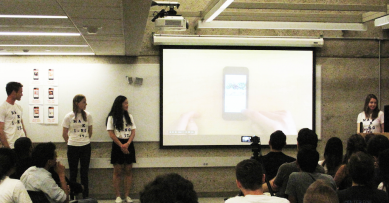 Hype – Like surfing the web, but don't care for the ads? Get Hype. It's an app developed by Genevieve Fowler '16, Megan Valentine '16, Max Payson '16, and Yuxi Liu '16. Sign onto the app, and ads appear. Swipe to right on your phone or iPad, and you save the ads that you like. Swipe to the left for the ones you don't. The more swiping you do, the more points you accumulate, which can be traded in for ad-free surfing on participating websites. Besides improving your online experience, the team says, it also better ensures that the ads that might actually interest mobile phone users will get their attention.
Hype – Like surfing the web, but don't care for the ads? Get Hype. It's an app developed by Genevieve Fowler '16, Megan Valentine '16, Max Payson '16, and Yuxi Liu '16. Sign onto the app, and ads appear. Swipe to right on your phone or iPad, and you save the ads that you like. Swipe to the left for the ones you don't. The more swiping you do, the more points you accumulate, which can be traded in for ad-free surfing on participating websites. Besides improving your online experience, the team says, it also better ensures that the ads that might actually interest mobile phone users will get their attention.

